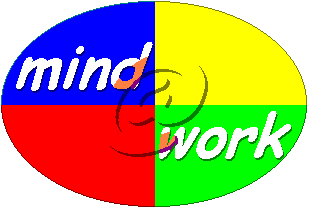More background information on why PC's and why not
Explanation given in the Group Facilitation ListAgain, there is a paradox here. The paradox of the message versus the medium.
I've been using PC technology, using an application of out own design - now called mind@work or minds2gather - , with facilitation for over, I think, 10 years now. The way i use computers is this:
See: See previous page
I've looked at and worked with several others system suppliers and met several times with their representatives in The Netherlands. The main difference between our application and the others is that i need or want the ideas of the participants on paper, on labels. None of the firms wanted to build a simple addition: print the generated ideas on cards! The reason, rather bluntly, is that 'they' are Information and Communication Technology experts and 'we' are Information and Communication Methodology experts.
(I've done a presentation of the way i work in a so called 'Future Center', were many new technologies are displayed for businesses. They were very interested in buying our application to use it themselves. Only after three times explaining how i work with the application, a worker in this center exclaimed: 'you're not selling a technique, you're selling a method'. Finally somebody understood - and then the manager decided he'd better have another system).
Because i know that meaning is a process, a process of creating common understanding, in Dutch: 'ge-meen-schap'. Meaning is being created while communicating. Communicating has two aspects:
- 'content' - the words you're reading (and that are on the cards - digital)
- 'relations' - as in the starting phrase 'Hello dear' (and that you exchange when clustering the cards - analogue).
In fact, it is not relations as such, but the relation-ship: the making (and braking ;-)) of the relations. Now, if you only have the message (who said medium?), as in the words you're reading on a screen, you have to assume things about the relations. We've become very good at that. The problem is, that we (you and i) can only use our own assumptions (and the assumptions about assumptions of others) and - you saw this one coming - you should always verify your assumptions. Information Systems, every system i know, uses what i've been told is called 'the Helsinki Principle': 'a message is understood the way it has been intended'. In other words: the assumptions used by the sender are not only somehow magically transferred to the receiver, but are also used by the receiver in the same way. But the meaning is in the context, not in the subtext.
This, in my view, is what happens during the clustering: people verify their assumption regarding the meaning of the message. They exchange contexts using, amongst others, body language, intonation, interpunction and 'what is not being said'. The medium is the conversation.
Why do i like using PC's for capturing ideas? For the same reason i use cards for capturing meaning. Of course, people can write their ideas on cards, BUT they make assumptions while writing cards. As they make assumptions when they type. And these assumptions are different. Most people tend to be more open while typing their ideas on a computer screen (or SMS-ing) then while writing them on a piece of paper. In the first case, they 'talk to their own self-image', in the latter they 'talk to their own image of themselves in the group'. Most people do not even bother to note the difference and some will even deny that there is a difference, and that may well be the case - as this is part of the way our consciousness works - , but i've sensed the differences since the first time i worked with this facilitation technique.
Most ICT-experts do not like facilitation, because it is an inefficient process. And it is. Group decision by a strong leader is much more efficient. That is why 'they' invented these fine applications. Most facilitators do not like - or even dislike - using computers in sessions. And we're right too. We think a group knows best. Facilitation aims at being effective. 'They' ignore the human aspect of communication and 'we' deny the technological aspect. So, we're in a win-win situations.
For information and documentation in the English language, please contact us through Contact mind@work VOF or janlelie by telephone (+ 31 70 324.34.75). You can also skype us at
 mindatwork
mindatwork
